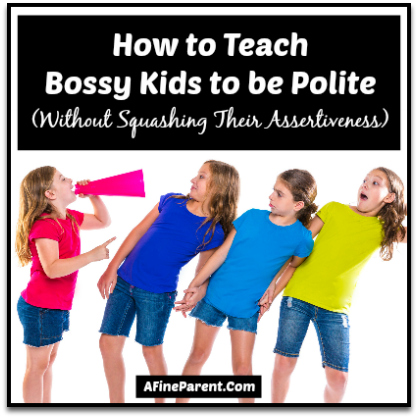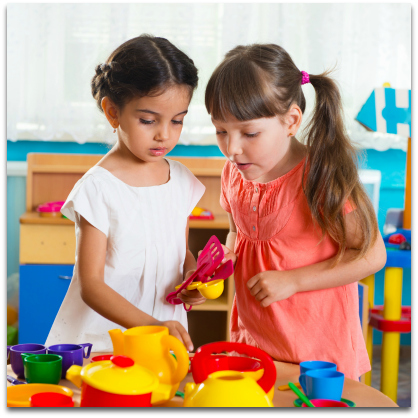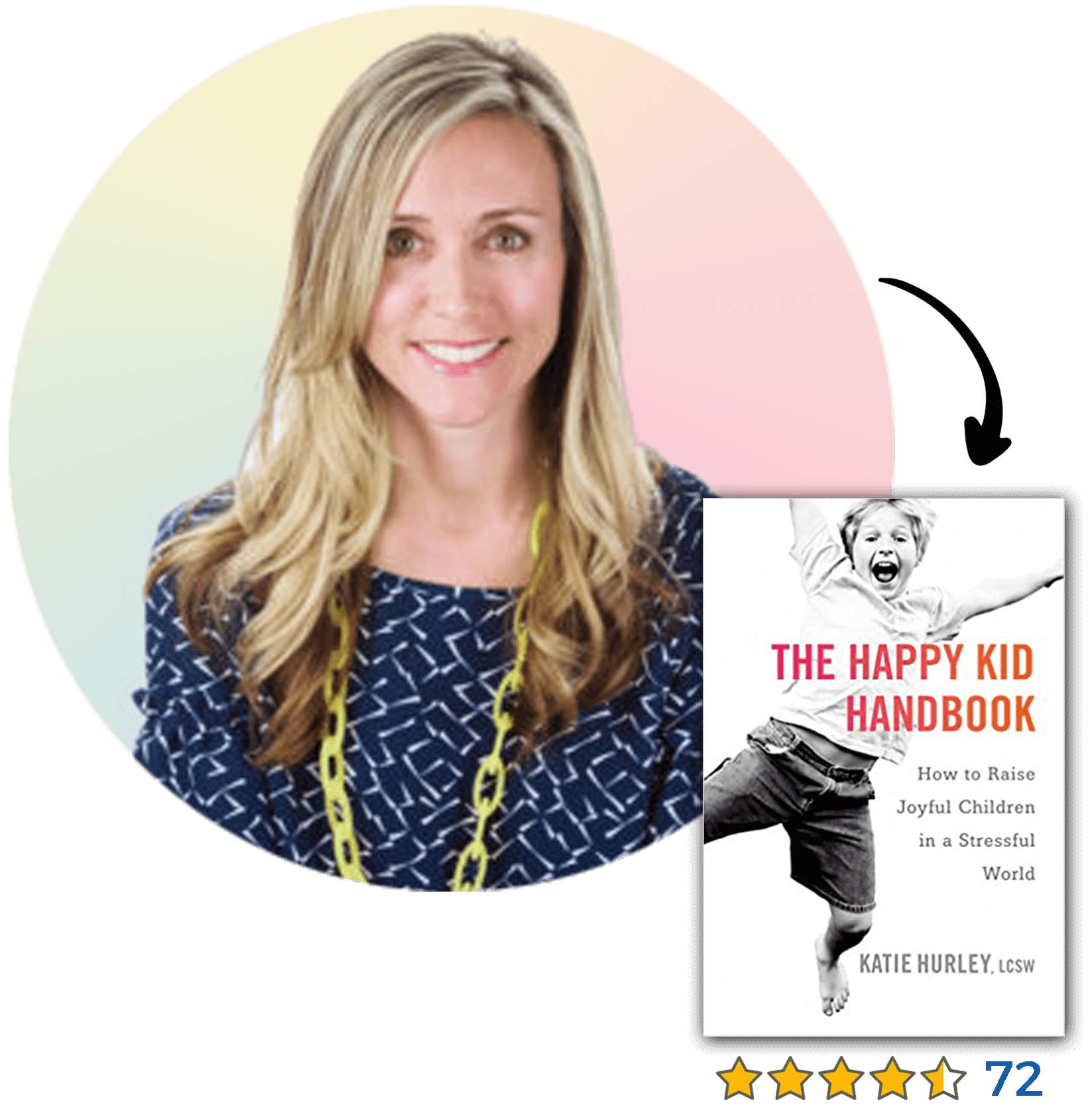 It’s a bit embarrassing when someone describes your kids in ways that are less than complimentary, isn’t it?
It’s a bit embarrassing when someone describes your kids in ways that are less than complimentary, isn’t it?
“She really tells the other kids what to do, doesn’t she? A right little bossy boots!”
You instantly feel the need to justify your child’s behavior, but later you wonder…
You wonder if your child really IS bossy.
You wonder about your parenting techniques and if you’re on the right track.
You wonder if you ought to be doing something when you see your child being assertive the next time.
My own daughter is strong willed and opinionated, and I wonder.
I watched her this morning, telling her younger sister what to do. She bossed her about mercilessly, all morning. The younger one took it very well, and largely did her sister’s bidding. But eventually she got sick of it, and grew mutinous. It’s then that the Boss’ behavior deteriorated, and she became rude and disrespectful.
That’s when my blood started to boil.
I don’t want domineering children, but I don’t want to squash their spirits, either. I want them to know it’s ok to have an opinion and be strong-willed.
But, in spite of myself, I almost labeled my daughter as bossy. I stopped myself in the nick of time — “bossy” is a lousy label to carry around.
As Facebook COO Sheryl Sandberg says, words like bossy send a message: it’s not ‘right’ to ask for what you want. It’s selfish. When we label behavior in this way, our children believe that behavior is ‘bad’ and ‘wrong’. Their self-esteem wears away, and their confidence slowly dies.
That’s not what we want.
As quoted in the Yahoo article “Since when did obedience become the epitome of good parenting?“, Alfie Kohn, the author of Unconditional Parenting: Moving from Rewards and Punishments to Love and Reason says that when he asks parents what their long-term goals are for their children, “No-one ever says mindlessly compliant.”
So how do we strike that balance as parents?
How do we teach our kids to express themselves without being bossy?
The answer is to help them to state their feelings in a way that is polite and courteous. Here are some things that I find helpful with my strong-willed daughter –
#1 Understand the difference between ‘bossy’ and ‘assertive’
 The words ‘bossy’ and ‘assertive’ are similar, and many people use the two words interchangeably. The difference between the two is small, but significant.
The words ‘bossy’ and ‘assertive’ are similar, and many people use the two words interchangeably. The difference between the two is small, but significant.
The oxford dictionary defines ‘bossy’ as
Fond of giving people orders; domineering.
Whereas, they define ‘assertive’ as
Having or showing a confident and forceful personality.
It’s that subtle difference that makes one an unflattering label and the other an admirable character trait.
Just this morning I heard “No! Don’t do that! Don’t touch my stuff or I’ll …”
I called my nine-year old over, and she glowered at me.
“What? She was touching my stuff without asking! She always does that, and it’s not right! I shouldn’t have to put up with it!”
I told her she was right. She didn’t have to put up with her sister touching her things without asking.
I told her it was OK to say what she wanted, but that she needed to think about how she was saying it.
Although I didn’t use the words ‘bossy’ or ‘assertive’, I did explain the key difference between the two ways she could tell her sister not to touch her stuff.
It takes time and repetition, but we need to help our kids see the difference and consider other people’s feelings while stating your own perspective.
 Ever wonder just how assertive is too assertive and how to teach a good balance to your children? We partnered with Katie Hurley, child and adolescent psychotherapist, writer and speaker, to learn more about how we can teach assertiveness to both our extroverted and introverted children; without endorsing bossiness along the way.This packed masterclass is one of the 70+ masterclasses you get when you join the AFineParent Academy today. Click here to learn more.
Ever wonder just how assertive is too assertive and how to teach a good balance to your children? We partnered with Katie Hurley, child and adolescent psychotherapist, writer and speaker, to learn more about how we can teach assertiveness to both our extroverted and introverted children; without endorsing bossiness along the way.This packed masterclass is one of the 70+ masterclasses you get when you join the AFineParent Academy today. Click here to learn more.#2 Be a model citizen
 Kids learn more from how we behave than from what we say.
Kids learn more from how we behave than from what we say.
“Who we are and how we engage with the world are much stronger predictors of how our children will do than what we know about parenting.” says Brené Brown, the author of Daring Greatly: How the Courage to Be Vulnerable Transforms the Way We Live, Love, Parent, and Lead.
We all know this at some level. Yet our actions are sometimes not in line with how we ask our kids to behave.
Consider this for example –
Your best friend is staying with you for a bit. She know you well, and she knows your house rules. One of your rules is no feet on the coffee table.
One day you walk in and find your friend relaxing on the sofa … with her feet on the coffee table!
What do you say? How do you behave?
Now consider how you’d behave if you walked in and found your kids relaxing on the sofa, with their feet on the table.
If you’re anything like me, the response is going to be very different. I’m unlikely to rant at my friend “You KNOW we don’t do that around here!”.
I won’t roll out the “I’ve told you a hundred times not to do that” line.
I’m more likely to be calm and reasonable. I’ll state my case with consideration for my friends’ feelings.
Why not give our kids the same consideration? Try treating them like a BFF and see the difference.
When I spoke to my daughter this morning, I said, “I’m not angry, and I’m not telling you what to do. I’m asking you to think about your sister’s feelings when you ask for what you want.”
Now, I’m not saying the whole situation was perfect, or that it won’t happen again. (I’m not that deluded!)
I do believe that demonstrating the assertive behavior I’d like her to display was very powerful. I showed her how to get her thoughts and feelings across in a way that was respectful of other people’s feelings. I demonstrated assertiveness, rather than being ‘bossy’ and telling her what to do.
#3 Translate the talk in a way they can understand
 The difference between ‘bossy’ and ‘assertive’ is challenging enough for adults to grasp. It’s almost impossible for kids to get.
The difference between ‘bossy’ and ‘assertive’ is challenging enough for adults to grasp. It’s almost impossible for kids to get.
So instead of talking to them about the concepts, teach the behavior to them in ways they can easily understand.
Here’s a few techniques that I like to use:
Practice makes perfect is, as the name suggests, simply practicing doing the right thing.
Your children take it in turns pretending they’re talking to their best friend or favourite star, on the phone.
You can make this more real by actually calling someone they know, and letting them chat on the phone.
Your children practice using their telephone manners during the call.
Playing a star role (or role-playing) is a powerful way of changing our behavior. That’s why we do things like fire drills – it reinforces behavior.
You can use role-play to reinforce scenarios where you’d like your kids to show good manners and courtesy.
Pretend you’re having tea with someone important. Depending on your children, this may be Dorothy the Dinosaur, Paddington, or Justin Bieber (maybe all three?)
Set the table appropriately and demonstrate to each other how you’d behave. You could even take it in turns to dress up as the ‘star’ guest.
A spoonful of medicine can come in handy when you’re role-playing.
While your child is pretending to talk on the phone, for example, you can interrupt so they know what it’s like. (Isn’t revenge sweet?)
Then you role-play what good behavior looks like in this scenario.
You can also ask, “Would you like me to speak to you like that?” or “How do you like people to speak to you?”
The Interrupt Rule is fantastic because it lets children know you’ve heard them, without actually interrupting. It’s respectful to both parties.
Here’s how it works.
You’re in conversation and your child needs your attention. Instead of calling out, they simply come up to you and put their hand on your arm.
They keep their hand on your arm so that you know they need you.
You cover their hand with yours, so your child knows you’ve ‘heard’ them.
When it’s appropriate, you can turn around and ask them what they need.
This rule is simple enough for even very young children to learn, and very effective.
Play it again, Sam is something I use at home when I don’t like what I hear.
I say “how could you say that in a kinder way?” or “how else could you ask for that?”
I ask the child to restate their intentions in a different way.
When I spoke to my daughter this morning, I asked her, “How do you like people to speak to you?”
I told her that the way she behaves with other people teaches them how she wants to be treated.
If she’s kind, she’s telling people to treat her kindly. If she’s angry or shouting, she’s teaching other people to shout at her.
#4 Keep it fun (AKA ask to be ex-squeezed)
 This morning, when I was speaking to my daughter about her behavior, I was in mid-sentence when she suddenly asked “Can I go now?!”
This morning, when I was speaking to my daughter about her behavior, I was in mid-sentence when she suddenly asked “Can I go now?!”
I was clearly boring her. I should have remembered to golden rule: keep it fun.
Manners, and other life lessons, can be pretty boring. Sometimes you need some light-hearted ways to teach this stuff. Mixing a bit of fun into the lesson makes life a lot easier.
When my younger daughter was about three, she got her words discombooberated (yes, this IS a word, at least in our house).
She finished her meal and asked “May I please be ex-squeezed”.
The situation was so funny and endearing that the ritual has stuck. We now ask to be ex-squeezed from the table, and then have a squeezey cuddle with mom or dad.
As an aside, visitors have almost fallen off their chairs when our children ask to be excused from the table.
Even more impressed were the parents who’s kids came to visit, and went home and started asking “May I be excused?” at the end of a meal. They thought we were SUCH a good influence!
Ex-squeeze me, while I grab my halo off the floor… 🙂
The key is to make manners, politeness, courtesy and all these other big words fun for kids to learn.
Other ways you can make manners fun are to sing songs that teach good manners, or read books that teach manners to spirited children.
At the end of the day, remember that your children are growing and changing all the time. Whatever behavior they’re demonstrating now, it’s likely it will change.
The best thing you can do is to encourage that change to be positive. Fostering strong willed children can be tricky, but working with a child is much easier than working against them.
You want your children to have opinions, and express themselves when they’re adults. You want them to keep striving to be a better version of themselves, just as you continually strive to be a better parent. You want the best for your kids. You want them to get the most out of life. You want them to be able to negotiate – to get what they want, but without hurting other people.
So please, teach them how to ask for what they want — in a respectful way.
The 2-Minute Action Plan for Fine Parents
Take a few minutes to consider your behavior with your family.
- We all have moments when we’re rushing to be somewhere, no matter how hard we try. Leaving these times aside, when was the last time you said please and thank you to your family?
- Think about what you say and do when you need your children to do something. Do you demonstrate assertive behavior, or does a little bit of bossy sneak in?
- How differently do you treat your children to your friends when they exhibit similar behavior?
- When you’re trying to get what you want, do you value good manners or focus on the outcome? Your children will pick up these underlying values, no matter how well hidden you think they are.
The Ongoing Action Plan for Fine Parents
Talk to you kids about the interrupt rule and see how it works for you. Try role-playing the rule in action so everyone gets a chance to use it.
Focus on improving manners and courtesy within your house by nominating a Manners Month. During the month you can read books and sing songs about manners, and come up with ways to make manners fun.
Keep the idea of being BFFs in your mind. Remember that you don’t want your child to grow up to be mindlessly compliant when they’re older, so it doesn’t make sense to expect that compliance now. Treating your children in a similar way to your friends will help them grow into the independent and self-reliant people they’ll become as adults.


Great article…well spoken.. used spoken instead of written because I felt it was a conversation with a friend. Sent to my adult children using the tease of a Brene Brown quote and promise of tools to deal with a bossy mother/grandmother in addition to their bossy older daughter, bossy youngest son, strong willed college student and family member who how shall we say it..is never wrong. A strong message from the coffee table example and how would we speak to a friend versus a family member. And yes lets try to be our best and reserve judgment and labeling the motives and behavior of others. Again well spoken.
And what about your youngest? It’s not ok for you to shut down the assertiveness of the older one, yet it is ok to let her destroy the younger child chance of ever being assertive?
That’s the thing, the older child is learning assertiveness usually by modelling the behaviour of a parent. This could be equally true for the younger child, they could also be assertive by modelling the behaviour of their sibling. It depends on personality type though, but I think it’s fair to say you can’t let the younger child do whatever they want as well (like touching things that aren’t theirs without consequences.)
I am a school counselor at an elementary school and I am preparing a lesson on not being bossy for kindergarten students as part of a social skills program. This article has given me GREAT ideas as well as some good laughs! Thank you for that!
Exactly what I needed! Thank you!
I have Asperger Syndrome (milder Autism, now just called Autism Spectrum Disorders or Social Communication Disorders) and am the oldest of 2 children (so I’m technically the older child, not the oldest child). I wouldn’t say I was ever bossy, but I have always had pretty high expectations for others. I have also been known to get on others about following rules and codes of behavior. That is fairly common for people on the Autism Spectrum, to reprimand or correct other people for their manners, grammar, and behavior.
My brother (2 years younger than me, and doesn’t have any disabilities) always seemed like he was just happy to hang out and just be a buddy when he was with his friends, rather than be the behavior or grammar police, enforcing all rules and codes of behavior. He always seemed like he wasn’t too concerned with his friends’ behavior unless it looked like it might hurt someone or something. He didn’t seem to make as big of a deal as I did if someone said something like, “I want more pizza,” rather than, “can I have some more pizza please.”
I was just wondering. Have you ever had your daughter evaluated to see if she has any disabilities? Have you ever had her evaluated for any sensory integration issues? Both of those things may be factors in why a kid exhibits controlling behavior like your daughter is.
I am a big sister myself and I have always had to deal with the way my little sister acted and I was sick of it. This website has helped me to realize that my younger sister is not bossy but has an assertive personality.
Great article, some very useful tips which I hope will work with my 6 year old daughter. I think she is losing friends at school because they are fed up with her bossy ways. I am not sure what my wife and I done in parenting, or if it is partly DNA (my wife is quite bossy!). But we will try and look at our own behaviour now and address how we speak to her.
She has been a better recently but when she is bossy she slips back into it very easily! Not helped by the fact I think she has built herself a reputation at school which is sticking. My fear is she is reverting back to her old ways because she thinks ‘what is the point’ when she is still blanked by her friends because of her bossiness in the past. Thanks for the tips though, we will try and remember to try these (not always easy in day-today life). Well done!
Hi Rana, it could be that she’s expressing pain at the loss of her father in which case it may be good to find a way to help her locate how she feels and to vocalise it to someone to release misunderstandings in her mind. Kids need to feel loved and valued by significant people ie parents / step parents, (don’t mean to state the obvious!) It could be that she’s being dominated herself in some area.
Hope that helps
Not sure if you can help me; but I have been researching a lot on this subject and all I have read and tried to put into practice with my 9-year old daughter has failed. I noticed that she is bossy towards her friends, her step father and even her teachers sometimes and it was confirmed by her teachers when I asked them for a feedback in her behaviour. She’s not bossy with me, she knows I don’t allow it. She has a very strong and domineering personality which is costing her friendships and the ability to have a happy social life. Is there something you can advise me with?
Thank you for the interrupt rule! I’m so excited to start doing that! This was my first visit to your blog and I look forward to coming back!
Glad you liked the article, Rachel. And so happy that you’ll be stopping by again. If you’d like to receive the articles directly in your mailbox, be sure sign up using the form at the top of this page. Take care!
This comes at a great time for me now that my daughter has transformed from a meek, overly-obedient child to a more assertive person (my preferred problem 🙂 ) I am trying to teach her to be more courteous in how she states her desires and needs. Thanks for the helpful article.
Glad it came for you at the right time, Viola! Good luck with your daughter… assertiveness can be a tough problem for us parents, but if we can help them channel it well, it will definitely serve our daughters well in their adulthood!
Thanks Sumitha! I need all the luck I can get! 😀
Cate, I love this post. You have concrete suggestions delivered clearly and thoughtfully. My favorite tip is #1, where you say:
” I told her (my daughter) she was right. She didn’t have to put up with her sister touching her things without asking.
“I told her it was OK to say what she wanted, but that she needed to think about how she was saying it.”
What you did that was SO fabulous was that you really took the time to listen to your daughter’s concerns. All too often we punish our kids for expressing their frustration without acknowledging that they have a legitimate reason to be upset! I know that I tend to behave better when I feel someone’s taken the time to understand my side of the story. 🙂
So you listened and then you modeled the right way for her to bring up the problem. Beautiful. Works for all ages, BTW!
Marianne,
Thanks for your kind comments – I’m glad you liked the article.
You’re so right about this technique working for all ages. The best way to handle any conflict is to agree with the person who’s confronting you. That doesn’t mean we need to agree completely, but to agree with something. Even saying “You’re right to feel angry about this” defuses the situation.
Unfortunately, this crazy-busy world we live in makes it hard to stop and take the time to listen, so it’s becoming a rare art. 🙂
Nice articles with full energy’ motivation and encourage. Thank you.
Glad you liked it, Mufiz.
Great article Sumitha and Cate.
I can testify that the Interrupt rule really works! It’s a great one to teach to kids.
A couple of other things I use for role-playing to demonstrate what to do and not to:
1. Puppets are great. They can do the misbehaving and the kids laugh and then tell the puppets how to do better. It’s a great way to get the message across without being didactic – after all, who wants to be told what to do.
2. Using a TV episode or book that demonstrates the undesired behaviour and consequences, is also a good way to get a point about behaviour across.
Thanks for your kind words Susan, and the fantastic tips. I love books to help kids work through real life issues.
I was really happy to discover the Interrupt Rule. I haven’t had a chance to try it yet though. Now that I have another endorsement for it, I’m all the more pumped to give it a shot!
And ooh, those two are good ones for role playing!!! We don’t use puppets, but stuffed animals of all shapes and sizes work just as well. And I can’t even begin to tell you how many times my daughter’s done something because of what Mama Bear told Brother and Sister Bear (we were big on the Berenstain Bears series :)).
Susan: I couldn’t agree more that using puppets is an excellent teaching tool. I teach second grade and use puppets in the same manner you highlighted; in doing so, the kids are thinking, interacting, having fun and learning — and they don’t even know it!
Cate: From the bottom of this father’s heart, thank you for this article. I have a 9-year-old daughter who is articulate and freely expresses her feelings and beliefs. Many times, however, the manner in which she does is off putting to her peers. I want her to maintain her assertiveness because she’ll need it throughout her life, but I want her to learn less-abrasive ways to express herself. Your article provided some approaches I hadn’t thought of previously. Thanks again.
Good article! Good manners go a long way in tempering the results of less than desirable behavior. I understand about treating people the way you want to be treated, and that premise translating into being less bossy. However, I resent the fact that the voices of “political correctness” are starting to dictate that the term “bossy” should no longer be applied to girls! I’m a bossy little girl who grew into being a strong leader with parental guidance! Assertiveness can be just as know-it-all, self-centered, and negative as bossiness, and it is not attractive, either, when parents push it and little girls don’t outgrow it!
I see your point, Jamie. But it doesn’t really bother me.
The way I see it, any label with negative connotations can contort the lens through which we see the person with that label – boy or girl, and the way that person sees himself/herself. So I try to focus on cutting out any negative labels and try to use a positive version of it whenever I can remember (whether I’m speaking about my daughter, my husband or even referring myself). To me bossy and assertive are those lenses – one has a negative connotation and the other has a positive one…
Wow! Well said!
Well said! Totally agreed there is a huge difference between “bossy” and “assertive”. Been bossy rub people the wrong way, it hurts them and it is not constructive. My grandmother used to say “ you catch flies with honey , not with vinegar “! It’s not what you say and how you say it that is important and will get you a better outcome .
I thought this article was beautifully written and plenty of examples were given for each scenario. Well done! Thank you Sumitha and Cate.
Thank you so much, Gloria! I really appreciate it 🙂
Yes! This was such a great and informative article!
IT might have been a helpful article had you given examples.
Thanks for the feedback, Kathy. We try to make our articles as helpful as possible. We’ll try to include more examples in our future articles.